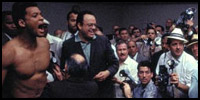
 |
Ali (2001) Directed by Michael Mann Cast: Will Smith, Jamie Foxx, Jon Voight, Mario Van Peebles, Nona Gaye, Jada Pinkett Smith, Michael Michele, Ron Silver, Jeffrey Wright, Mykelti Williamson, Albert Hall, Joe Morton, LeVar Burton, Giancarlo Esposito, Charles Shufford, Michael Bentt, James Toney, Candy Brown Houston 2001 – 158 minutes Rated: Reviewed by Dustin Putman, December 26, 2001.  A biopic of arguably the greatest heavyweight boxer of all time, "Ali" is shortchanged by director Michael Mann (1999's "The Insider"), who needlessly has decided to focus on only ten years of the nearly 60-year-old's life. We only get one scene of Cassius Clay (who later changed his name to Muhammad Ali) as a child, none as a teenager, and nary a glimpse of his life following the victorious 1974 match with George Foreman in Zaire. In doing this, Mann has stripped away any possible insight into the man himself--who he truly was as a person, why he chose to go into boxing as a profession, and where his life led him following the mid-'70s.
A biopic of arguably the greatest heavyweight boxer of all time, "Ali" is shortchanged by director Michael Mann (1999's "The Insider"), who needlessly has decided to focus on only ten years of the nearly 60-year-old's life. We only get one scene of Cassius Clay (who later changed his name to Muhammad Ali) as a child, none as a teenager, and nary a glimpse of his life following the victorious 1974 match with George Foreman in Zaire. In doing this, Mann has stripped away any possible insight into the man himself--who he truly was as a person, why he chose to go into boxing as a profession, and where his life led him following the mid-'70s.
"Ali" opens with a 10-minute bang, as 22-year-old boxer Cassius Clay (Will Smith) is introduced as he trains for an upcoming match with Sonny Liston (Michael Bentt) and jogs on the dark, desolate streets. These powerfully wordless images are fluidly intercut with musician Sam Cooke singing the irreverent "Bring It on Home to Me" to a swooning crowd at a night club. Moving at a clip pace, this masterful, entrancing prologue is as good as the movie gets.  Following the surprise 1964 defeat over Liston, Cassius finds himself springing to the big times of the sport, all the while his Muslim religion, taught by Elijah Muhammad (Albert Hall) and Malcolm X (Mario Van Peebles), has landed him in the hot seat by the press. A free-thinking man who only does what he wants to do, Cassius soon changes his name to Muhammad Ali, which earns him an even greater state of fame. After a short-lived run-in with the law over refusal to go to Vietnam, Ali finally sees a chance to return to the limelight, as his infamous Zaire fight with George Foreman went on to be termed the "Rumble in the Jungle."
Following the surprise 1964 defeat over Liston, Cassius finds himself springing to the big times of the sport, all the while his Muslim religion, taught by Elijah Muhammad (Albert Hall) and Malcolm X (Mario Van Peebles), has landed him in the hot seat by the press. A free-thinking man who only does what he wants to do, Cassius soon changes his name to Muhammad Ali, which earns him an even greater state of fame. After a short-lived run-in with the law over refusal to go to Vietnam, Ali finally sees a chance to return to the limelight, as his infamous Zaire fight with George Foreman went on to be termed the "Rumble in the Jungle."
Written by Stephen J. Rivele, Christopher Wilkinson, Eric Roth and Michael Mann, "Ali" is a stylish, but severely flawed, drama that only gives the viewer a cursory understanding of Ali's most famed ten years. At over two-and-one-half hours, the film has seemingly been cut with a chainsaw. Mann spends way too much time on certain events in Ali's life (the Zaire scenes take up the last 45 minutes), and hurriedly rushes through other occurrences and relationships that may have strengthened the development of Muhammad Ali. In addition, the assassinations of both Malcolm X and Martin Luther King Jr. are superfluously depicted and then never spoken of, leading the viewer to wonder what director Mann's goal was in taking on this project at all.  Rising from the countless dubious imperfections is Will Smith (2000's "The Legend of Bagger Vance"), who has physically sculpted and transformed his body into Ali's. In the first time since 1993's "Six Degrees of Separation," Smith has been given the chance to put his career past behind him and develop a character and performance that is absent of Smith's usual acting style and persona. Simply watching Smith in action is a veritable treat, but his surroundings let him down every step of the way.
Rising from the countless dubious imperfections is Will Smith (2000's "The Legend of Bagger Vance"), who has physically sculpted and transformed his body into Ali's. In the first time since 1993's "Six Degrees of Separation," Smith has been given the chance to put his career past behind him and develop a character and performance that is absent of Smith's usual acting style and persona. Simply watching Smith in action is a veritable treat, but his surroundings let him down every step of the way.
Jamie Foxx (1999's "Any Given Sunday") may have the second largest role, as Ali's friend and manager, Drew Brown, but the standout performance comes from Jon Voight (2001's "Tomb Raider") as sportscaster Howard Cosell. Smith and Voight, who disappears into his sharply written part, connect in a way that no other figures do in the film, as they play off each other in the form of humorously acidic barbs.  Every other actor walks in and out of the film with messy rapidity and next to no added dimensions. Ali's first three wives are especially wasted, especially first spouse Sonji Roi, played by Smith's real-life wife Jada Pinkett Smith (2000's "Bamboozled"). Given more to do is newcomer Nona Gaye, memorable as second-wife Belinda Boyd. In trying to explain Ali's love for women, Mann has deleted all signs of passion, making his romantic relationships appear to be more like emotionless distractions.
Every other actor walks in and out of the film with messy rapidity and next to no added dimensions. Ali's first three wives are especially wasted, especially first spouse Sonji Roi, played by Smith's real-life wife Jada Pinkett Smith (2000's "Bamboozled"). Given more to do is newcomer Nona Gaye, memorable as second-wife Belinda Boyd. In trying to explain Ali's love for women, Mann has deleted all signs of passion, making his romantic relationships appear to be more like emotionless distractions.
"Ali" concludes in a jarringly abrupt manner, directly after he beats Foreman. Aside from being presented as a person not afraid of standing up for what he believes in, he is given no favors in turning him into a sympathetic figure. Whether completely truthful or not, Ali appears to have been a talented athlete otherwise guilty of self-absorption and careless womanizing. Mann's greatest flaw is that he is never able to successfully capture the joy and spontaneity of the subject's life and experiences. With beautifully stark cinematography by Emmanuel Lubezki (1999's "Sleepy Hollow") and a pulsating music score by Pieter Bourk that hints at how highly charged the film might have been, "Ali" is an intriguing failure that ultimately leaves you disappointed, rather than inspired or invigorated. ©2001 by Dustin Putman |
 |













